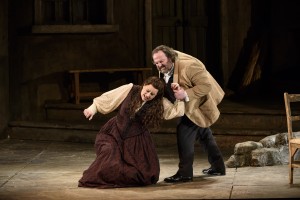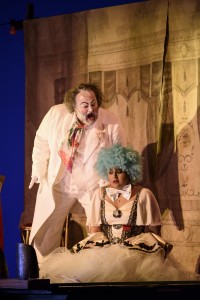I suspect the singers in Mascagni’s Cavalleria and Leoncavallo’s Pagliacci when first performed in Wales when WNO was formed 70 years ago would have thoroughly enjoyed this production and the singing even more.
As so often the greatest strength of WNO, whatever the artistic director, individual director, management etc., is the chorus and in Cavalleria rusticana especially the men and women give us an evening of rapturous and spine tingling singing.
I suspect the quality of the principals has also rarely been better with two Welsh performers in particular – I know that should be taken for granted but until quite recently our own singers seem to have often been overlooked – in sumptuous form.
This Elijah Moshinsky production of the frequently paired double bill, designed by Michael Yeargan, was created for WNO’s 50th anniversary and stands up just as well 20 years later. The two operas use contrasting styles, Cav as a picturesque Sicilian village, warmly lit, rich in detail, solid and so conventional that it is, well, unconventional. I Pagliacci shifts the action to Calabria and into the mid-20th century with movie posters, post-war fashion and hairstyles, a dusty, down at heel small world where passions are hot and frustrations palpable.
There is commonality in the thuggish, brutal, masochistic nature of the two societies, the violent consequences of male egos, the consequence of jealousy, suspicion, rejection and ultimately revenge. These are both blunt, ugly stories, involving rather unlikable characters, with raw emotions poured out in beautiful music.
Here revived by Sarah Crisp the cast is full-bodied and full-bloodied. Those three key characters are sung with so much power and conviction the audience was gripped from start to end of the one-act opera. What made this performance most memorable was the hold the elegant soprano Camilla Roberts has over the role of Santuzza, disgraced and jilted by Turiddu. Her revenge is served hot. Her performance is magnificence, not just vocally but dramatically. It has been a delight watching the singer’s career develop through a myriad of roles as she has worked, always a consummate professional, and it all shows in this stylish and skilfully drawn characterisation.
Camilla Roberts and Gwyn Hughes Jones
Rebecca Afonwy-Jones
David Kempster
While it is in Pagliacci that Gwyn Hughes Jones knocks our socks off his singing of Turiddu is a bravura performance by a tenor at the top of his game. As the weak, two-timing lover of Santuzza, he starts as a repulsive character but when faced with the unavoidable consequence of his actions he managed to evoke genuine belief in his acceptance of his guilt and then his betrayal of Santuzza. Alfio, the husband of Lola, the woman Turiddu has been messing round with is solidly sung by Welsh baritone David Kempster with Anne-Marie Owens singing Mamma Lucia and Rebecca Afonwy-Jones’ Lola giving pleasing support.
It is in Pagliacci that we see Gwyn Hughes Jones as the clown Canio grabbing the title of Wales’ top tenor at last getting the recognition in his homeland he so richly deserves. He exchanges roles with a subtle musicality that gave vocal differentiation to match the dramatic. It is in the show stopper “Vesti la giubba” as the jilted, desperately jealous and suspicious performer having been told by the Iago-like Tonio where he sings his heart out. That so famous of opera scenes ends with the grease-paint brutally applied to his face as surrenders to his burning desire for revenge.
Gwyn Hughes Jones and Meeta Raval
David Kempster and Meeta Raval
Meeta Raval
Gyula Nagy and Meeta Raval
The battered troupe’s truck drives into a rough piece of land on the edge of town where the show will be performed late at night when the heat has eased, at least the heat of the day. The truck had fold down panels to form the stage where the vile and macabre commedia dell’arte plays out.
There is nothing subtle about the characterisation and here David Kempster is drawn as the bitter, twisted and revenge-fuelled Tonio, his leg in a brace that he drags behind him and is mimicked by the object of his affections, Canio’s frustrated and adulterous partner Nedda. This tricky role is sung and acted by a sprightly and charming Meeta Raval. Her love interest is a virile Hungarian-born bariton Gyula Nagy as Silvio and as Beppe the young Trystan Llŷr Griffiths makes his mark as a likable young singer.
With the repertoire in his veins, Carlo Rizzi conducts with total control and happily the Cardiff audience completely appreciated this along with that such cherished asset, the chorus. Has the Easter Hymn in Cavalleria ever sounded better?
This is a double-bill that will keep the most die-hard traditionalist happy while those looking a little deeper will see an intelligent approach and, most importantly, singing and orchestral playing worth celebrating.
Main image: Camilla Roberts
Photos: Bill Cooper
Cavalleria Rusticana and Pagliacci at Wales Millennium Centre June 1 and 4.
Also performed is season:







After such glowing reviews I am looking forward more than ever to seeing both productions next weekend.